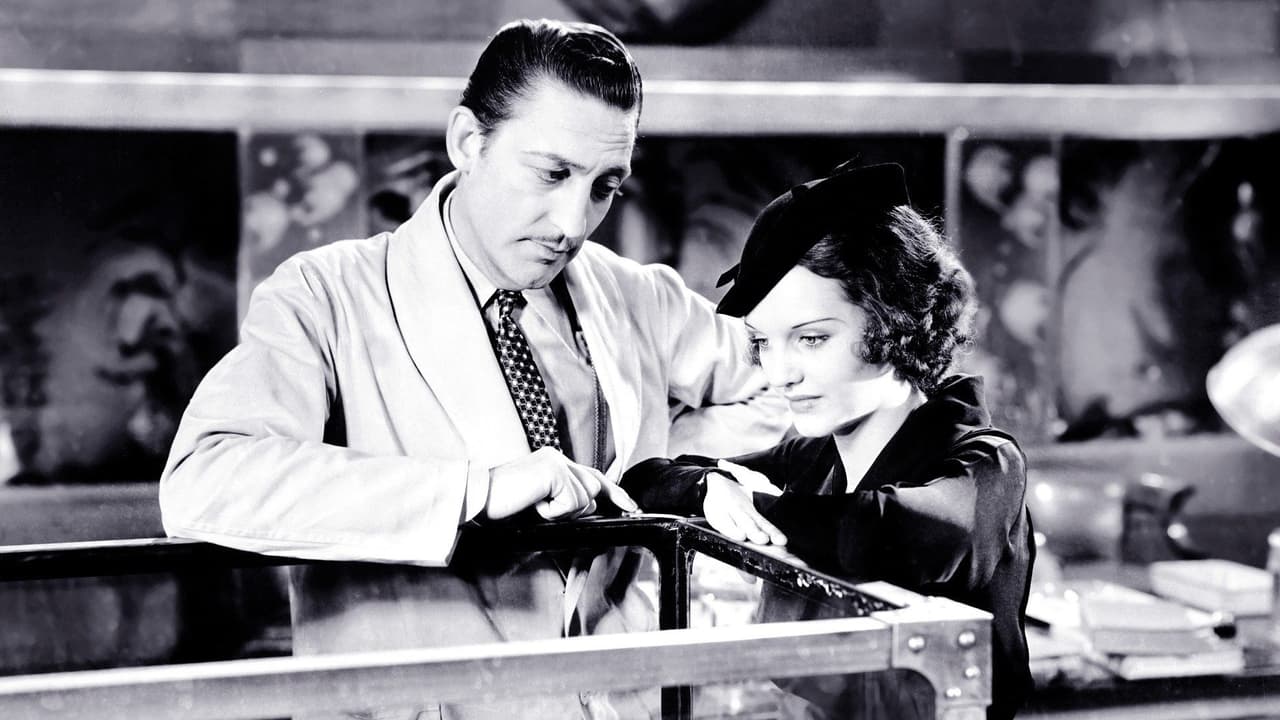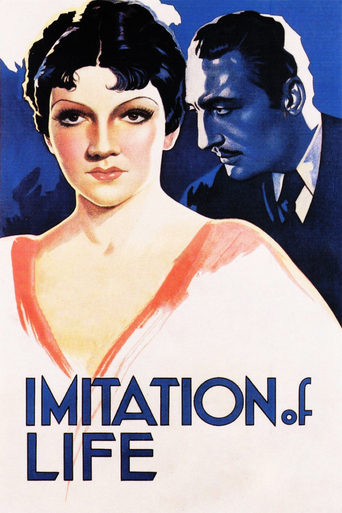Inadvands
Boring, over-political, tech fuzed mess
Ogosmith
Each character in this movie — down to the smallest one — is an individual rather than a type, prone to spontaneous changes of mood and sometimes amusing outbursts of pettiness or ill humor.
Myron Clemons
A film of deceptively outspoken contemporary relevance, this is cinema at its most alert, alarming and alive.
Billy Ollie
Through painfully honest and emotional moments, the movie becomes irresistibly relatable
touser2004
Representing the struggle that Peola has with a black mother is way ahead of its time but that isn't enough to call it a great film.Beavers was excellent but unbelievable that she wouldn't want a share of the company her recipe created. Elmer Smith was very annoying and Colberts reaction to her daughters infatuation with Stephen Archer was strange to say the least.The scene where Peola begs for forgiveness at her mothers funeral is heartbreaking but other than that a forgettable film
sconn4200
I was amazed to learn that there was another version of "Imitation of Life", quite different from the one done in the 50's. Forever, I claimed the Lana Turner version as one of my favorite movies until I saw the original classic done in1934 with Claudette Colbert, handsome Warren Williams and Louise Beaver playing Delilah Johnson.The dedication and loyalty Ms. Beaver showed for her employer was so genuine and touching but, on the flip side, it also showed how naive she was about securing her own future. I immediately associated this film with the story of Aunt Jemima, since that title is synonymous with the "Mammy prototype" which can be categorized as a black female servant who is extremely protective of her white employer and feels she must take care of her. Miss Colbert, on the other hand, displayed admiral qualities since she insisted that Ms. Beaver profit from her labor.I think minorities would appreciate this version more than the latter because the "lessons learned" would have more significance.Great Storyline
bkoganbing
When Imitation Of Life came out in 1934, Fannie Hurst was at the height of her literary reputation having had her two best works this one and Back Street, come out back to back as both novels and movies. Both stories are about a women's sacrifice.One day before World War I, Louise Beavers comes looking for domestic work and gets the wrong address and comes knocking on Claudette Colbert's door. Colbert is a recent widow with a child and Louise has a child the same age. Colbert can't afford any salary, but Louise is willing to work cheap, just for room and board for herself and her child. This starts an unusual partnership both personal and business because Claudette's late husband was a seller of a cooking syrup and Louise makes a melt in your mouth type of pancake. When passing stranger Ned Sparks tells her one day to package the flour, this makes both Colbert and Beavers millionaires overnight. Beavers can't see it however and passes up her own household to stay with Claudette.A lot of people today look at Beavers's character and say this is a racial stereotype that Hurst was perpetrating. Taking the racial component out of it, I've seen several people who are just like Beavers in their own way. Clark Gable had a father who could have lived quite well off his son, but couldn't deal with the Hollywood lifestyle and actually told his son they ought to resume their previous occupations as oil roughnecks. Stan Musial when he was making big money as a baseball star had a mother who took in washing back in the little steel mill town of Donora, Pennsylvania where he came from and not because he wasn't willing to provide.And I had an uncle who worked hard at Kodak and also built up a milk delivery business of his own and at an age where he could have just relaxed and taken it easy, he was out working at close to 80 at a tool and die plant. There are folks out there who shy away from the outward trappings of success like Beavers. And there are those stubbornly over-committed to a work ethic when they don't have to be.Both Colbert and Beavers are just moms with problem daughters on their hands. Daughter Rochelle Hudson is crushing out on Warren William who has his eyes on Colbert. But Beavers has bigger problems.Remember these girls were literally raised together with their mothers in business. Fredi Washington sees the white world, she's light skinned enough to pass, she wants what's over in that world. But her denial of heritage hurts Beavers more than my words can describe. But Hurst's words in the novel and the screenplay betray a rare understanding of racism during her time. Imitation of Life got three Oscar nominations including Best Picture. It's a dated film, but that fact alone makes it worth watching as a glimpse of the racial picture in America in the Thirties.
theowinthrop
One can make a case that this film about the African - American racial realities of the New Deal period is the equivalent of "House Of Rothschild", a contemporary movie regarding Jews and anti-Semitism. Both movies are very well-intentioned for their day, but are somewhat appalling for the present day. "House Of Rothschild" had great performances by George Arliss as Nathan Rothschild, and Boris Karloff as his German foe, the bigoted Baron Ledranz. But it suggested that the key to the emancipation of the Jews (and their acceptance by gentile society) was tied to economic success and power. This ignored the roots of anti-Semitism in economic jealousy by non-Jews. In "Imitation Of Life", we see two poor single mothers, one white and one black, each with a daughter, who form a partnership that enriches them with an "Aunt Jemimah" baking empire. But in the real world, how frequently did white and black people cooperate that closely when millions of dollars were at stake? The ideas, however, of this film are not easy to reject totally. Forgetting the idea of inter-racial economic cooperation and money making, the idea that a white and a black woman could become close is not totally impossible, and the issues of the problems both women have with their daughters are still relevant.Claudette Colbert (Bea Pullman) and her daughter Rochelle Hudson (Jessie) find that they become rivals for Warren Williams (Steve Archer). The rivalry of the pair for the same man is not uncommon, and the sad resolution of the problem seems unfair to Bea. Wisely the script does not settle what the future will prove about this collision of sexual hopes.No such problem faces Louise Beavers (Delilah Johnson) and Freddie Washington (Peola). Beavers is a hard working, decent woman who is fully aware of what the average White person expects of a Black person's "attitudes" in the America (or Western World) of 1934. Subserviance is the key for survival. Beavers, in the story, is luckier than most of her people because she has made a large amount of money as Colbert's business partner. But she can only get so far with that advantage - she can't live in a mansion and hobnob with the social elite. But she doesn't really seem to care to. The old (and infuriating) phrase about "knowing her place" is acceptable to her. But Peola is light skinned, and can pass herself off as white. She desperately wants to do so - to "sneak" (for want of a better term) herself into the majority of the population, with all the attending economic, political, and social advantages. And Bea wants Peola to accept her racial difference.Today, of course, we feel that it is the sin of the society penalizing millions of non-whites that is the terrible wrong, not Peola's desperate attempt to grab at happiness. But in 1934 it was Peola who was found to be wrong. Her selfishness leads to killing the saintly, decent Delilah, and Peola realizes this at the conclusion - at her mother's funeral.Before leaving this I have to point out that Peola's gamble probably would have been difficult in the long run. In the 1920s, New York society was shocked and titillated by the Kip Rhinelander Divorce Scandal. The son of a wealthy old New York family, Rhinelander married a very attractive woman. Then their child turned out to be African-American. The resulting divorce action was very ugly. If Peola married a white man, she would run a similar risk (as would all "white" descendants of the couple) due to genetics. Oddly enough, this particular situation is not a dated story theme. On an episode of LAW AND ORDER about six years ago, the murder of a woman was tied to her trying to regain her son by her ex-husband: the husband (like Peola) could pass himself off as white, and was a high ranking business executive with a new wife, who was white, and also a bigot.Among other things to note in this film is the use of the "Aunt Jemimah" clone in 1934 - a key to the long term success of that brand with the American public (and one that still exists), and the business deal that Ned Sparks and Colbert are negotiation with a clone of General Mills or some other food conglomerate. The funeral of Delilah also is notable, for the appearance of members of the Black Middle class in the scenes, in particular the men in quasi-military uniforms who must belong to some "mason" like club, and who give the deceased a goodbye beneath their outstretched military sabers. The appearance of Preston Sturges as one of the screenplay writers suggests some of the touches - Sturges liked to poke fun at well known brand names. In "Christmas In July", for instance, the coffee company is Maxford's (like Maxwell House).I find this a well acted and thoughtful movie for 1934, and yes, Louise Beavers did give her most tragic performance in this film. But the acceptance of racial inequalities that really are not acceptable anymore (although much improvement is still needed) does stick in one's craw.

